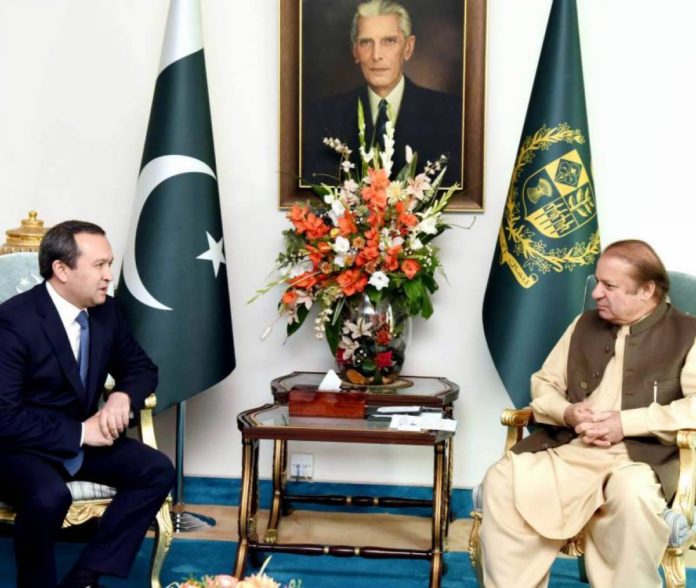Deputy Prime Minister of Uzbekistan Ulugbek Rozilkulov visited Pakistan in Dec last year and held various meetings with high officials, including Prime Minister Mian Nawaz Sharif and President Mamnoon Hussain. During the meetings both sides stressed the need to make efforts to enhance cooperation in the economic and commercial fields and exploit the huge potential for mutual trade.
Prime Minister Nawaz Sharif
The PM said that Uzbekistan’s impressive annual economic growth and rich energy resources and Pakistan’s large industrial and agricultural base provide an ideal environment for expansion of trade and commercial cooperation between the two countries.
Doable Propositions
He proposed that both countries work together for making appropriate reforms in trade policies to facilitate trade, investment and the free flow of goods and services between Pakistan and Uzbekistan. He also suggested that both the countries should formulate a joint integrated strategy to exploit the potential of trade in the region, especially in view of the China-Pakistan Economic Corridor (CPEC).
Deputy Prime Minister Ulugbek Rozikulov
Ulugbek Rozikulov said that all necessary steps would be taken to explore and exploit the huge business and trade opportunities between the two countries. He extended an invitation to the prime minister on behalf of Uzbek President to visit Uzbekistan which was accepted.
President Mamnoon Hussain
President Mamnoon Hussain has said that Pakistan and Uzbekistan will work together to fight terrorism and extremism. While talking to Deputy Prime Minister of Uzbekistan Ulugbek Rozilkulov, President Mamnoon said that the people and armed forces of Pakistan have bravely faced the challenge of terrorism and the menace has greatly been defeated.
Mamnoon said that Pakistan and Uzbekistan were bound together in terms of faith, culture and geographical proximity. He underlined Pakistan’s desire to further expand cooperation with Uzbekistan in the fields of energy, economy and human resource. The president noted that bilateral trade volume between the two countries was less than the potential and called for enhancing it to the benefit of the both countries. He also called for regular exchange of trade delegations adding that Pakistan was interested in benefiting from Uzbekistan’s rich energy resources. He said that both countries should benefit from each. Ulugbek Rozikulov said that Uzbekistan greatly values its friendship with Pakistan and both countries will cooperate with each other in various sectors.
Minister for Commerce
The Minister for Commerce said that the visit will be helpful in promoting trade and economic relations between the two countries. The minister informed the delegation that tremendous trade potential existed between the two countries and that the bilateral trade between Pakistan and Uzbekistan is not reflective of the true potential.
Volumes of Trade
The trade volume between the two countries at present is at the level of US$ 3.92 million in 2015-16 which has increased from US$ 2.98 million in 2014-15. Pakistan’s exports to Uzbekistan have witnessed marginal increase from US$ 1.347 million in 2014-15 to US$ 2.07 million in 2015-16 while imports from Uzbekistan have also slightly increased from US$ 1.56 million to US$ 1.843 million during the same period.
Imports & Exports
The major export commodities include energy products, cotton, gold, minerals, fertilizers, ferrous and nonferrous metals, textiles, foodstuffs, machinery and automobiles while the major import commodities include machinery and equipment, foodstuffs, chemicals, ferrous and nonferrous metals.
“Barriers and Challenges”
Speaking to the visiting delegation, the minister was of the view that there were certain issues that hampered expansion of bilateral trade like lack of Direct Cargo Links, Safe and Direct Land Routes, Marketing Strategies, Knowledge of Pakistani Products, Visa Facilitation and Costlier Transportation by Air. “Barriers and challenges are there but we have to work together to remove the barriers and facilitate the trade”, he minister.
The minister proposed that Pakistan and Uzbekistan may explore opportunities for Joint Ventures in Textile. “There is also need to revive the forum of Joint Commission and the next session may be held at the earliest”, added the minister.
He informed the delegation that Memorandum of Understanding between Trade Development Authority of Pakistan (TDAP) and the Uzbek Ministry of Economic Affair and Investment has already been signed which aims at promoting and developing trade links between the two countries. “In this regard, a Central Asia Trade Caravan/ Roadshow including single country exhibition is planned to be held in 1st quarter of 2017”, added the minister.

Uzbekistan’s Special Economic Zones
Rozikulov Ulugbek informed the minister that Special Economic Zones have been created in Uzbekistan with zero tariffs and Pakistani investors can get benefitted from it.
Uzbekistan Sustained Industrial Growth
The Republic of Uzbekistan has achieved sustained industrial growth due to rigorous series of reforms in different spheres of its vibrant macro-economy especially in productive channels relating to all industries. Uzbekistan is now on the way of massive industrialization which would achieve smarter and innovative industries in a short span of time.
Uzbekistan’s Industrial Production
According to Uzbekistan Ministry of Economy (November, 2016), industrial production in Uzbekistan increased 7.20 percent year-on-year in January-September of 2016. Industrial Production in Uzbekistan averaged 20.20 percent from 2004 until 2016, reaching an all-time high of 41.12 percent in the second quarter of 2006. Moreover, it is one of the ideal countries for seeking inflows of foreign direct investments (FDIs) in the region and beyond which has already attracted more than US$ 235 billion since its independence.
Uzbekistan’s Medium-Term Program
The Ministry of Economy of Uzbekistan is developing medium-term programs for the development of industrial sectors for the years 2015-2020, the implementation of which will increase the share of this sector in GDP to 35 percent from 24.2 percent in 2013. Currently, the Government of Uzbekistan is implementing a similar program for the period 2011-2015, worth a total of $30.1 billion. By some estimates, the new industry development program can include projects with a total cost of about $50 billion.
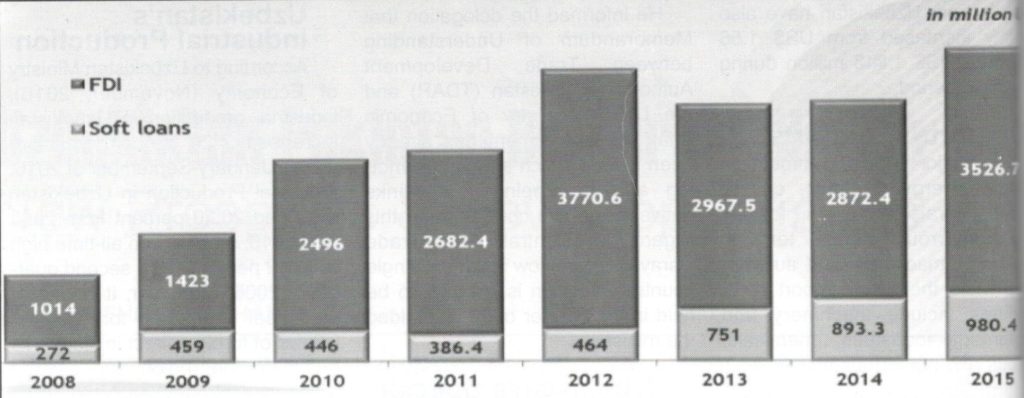
Uzbekistan’s Massive industrialization
Massive industrialization drive in Uzbekistan has already transformed its macro-economy and produced high-tech industries, value-addition products and also broadened its product mix of national exports. From early days of independence, Uzbekistan’s leadership adopted a policy for attracting the most advanced technologies and foreign investments which is now paying dividends. Uzbekistan is now one of the most industrially advanced countries in the region.
Share of Industrial Production in GDP
According to Uzbek figures (August, 2016), the share of industrial production in GDP of the country comprised totally 14.2 percent in 2000 which reached 24 percent in 2014. Active implementation of State Investment and Localization Programs is facilitating steady growth of industrial production in the country.
Multiplier Effects of Massive Industrialization
Due to massive industrialization in Uzbekistan its export volume for the period 1990-2015 has increased more than 30 times. Share of finished products in export increased from 30 percent to 76 percent. Over the past 10 years export of high value-added products sharply increased, including: automobiles, 12 times, textile 4.4 times, and chemical products 11.3 times. According to Uzbek figures, industrial production will be in range of 8.5 to 9 percent of GDP during 2016.
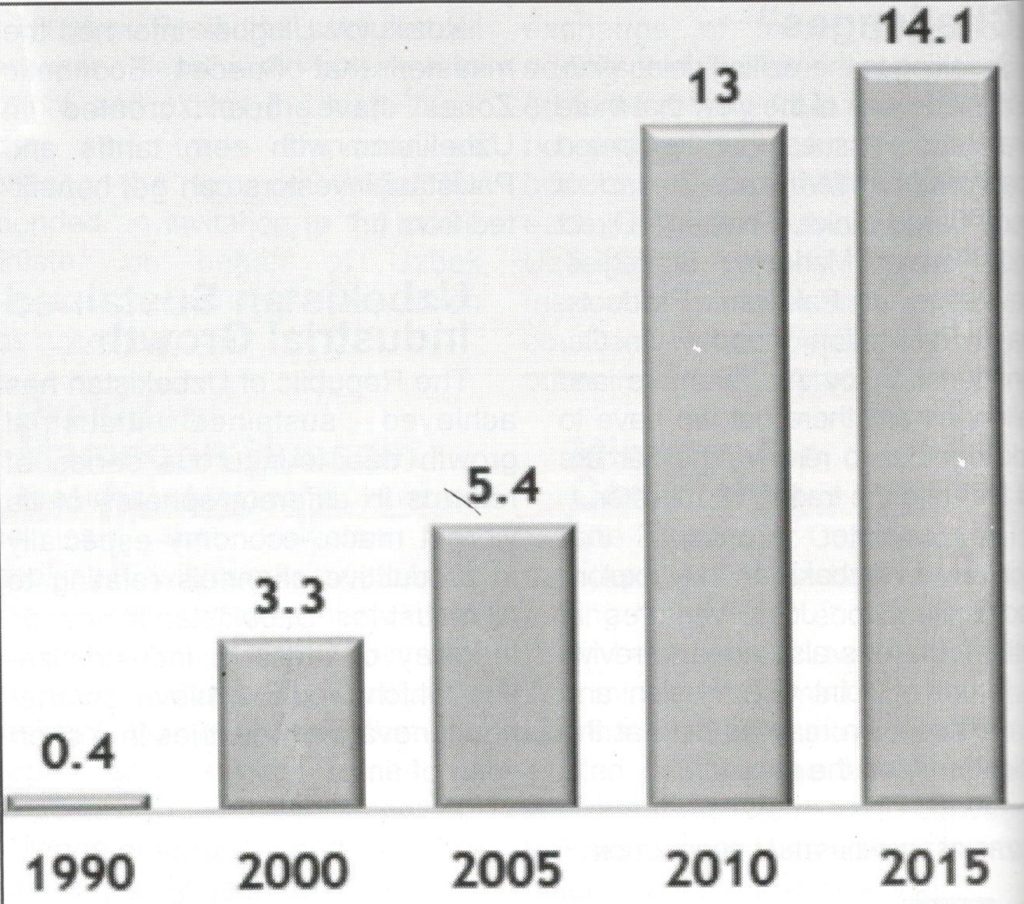
Favourable Investment Climate
Favourable investment climate and stimulating measures, as well as guaranteed protection makes steady investment flows into industrial sector in Uzbekistan allow creating entirely new industries, such as automotive, petro-gas-chemicals, oil and gas equipment, railway engineering, production of modern building materials, home appliances, pharmaceuticals, food and textile, etc. These industries produce more than 60 percent of the total industrial output with high added value, which is competitive on the world market.
Automobile Industry
Today its automotive industry consists of 200 companies employing more than 25,000 people in Uzbekistan. A number of joint ventures have been developed with world famous automakers like General Motors, MAN, Isuzu and Itochu and successfully operate in Uzbekistan. Uzbekistan and Pakistan may cooperate in the automobile sector and may also build a joint venture for the benefit of both the countries.
Oil & Gas Industry
As part of the program to ensure energy independence and development of oil and gas processing industries, Bukhara Oil Refinery, Shurtan Gas Chemical Complex, Kungrad Soda Plant, Dehkanabad Potash Fertilizer Plant and a number of other high-tech production facilities were built in collaboration with foreign partners. Currently, the Ustyurt Gas Chemical Complex at Surgil field is under active construction. Since Pakistan is experiencing energy deficit so both countries may cooperate in this sector in the days to come.
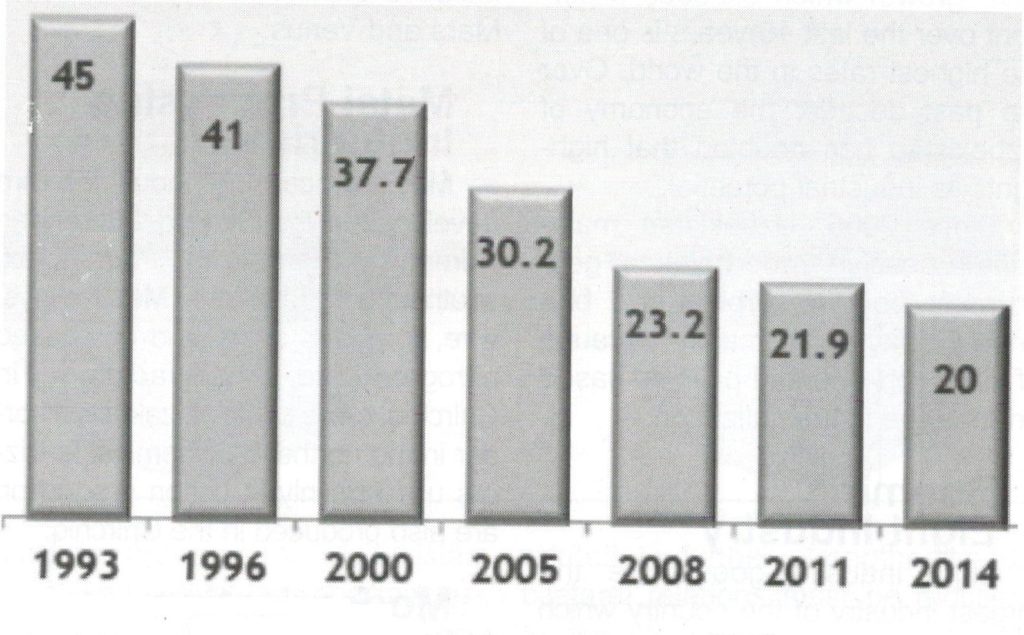
Business Friendly Policies
The government of Uzbekistan has already cancelled 160 licensing procedures and requirements for obtaining a license for 19 types of business activities. Tax burden has decreased more than 3 times. Single tax payment for small enterprises in industrial sector is 5 percent. Frequency of statistical, tax and financial reporting to Governmental authorities have been cut in half over the past years. Moreover, statistical and tax reporting system has been reduced in the last few years.
Existence of International Brands
Now, nearly a thousand enterprises established with participation of foreign investments, including the world famous corporations, such as “General Motors”, “MAN”, “Knauf”, “Itochu”, “Rieter”, “Klaas”, “Nestle”, “Coca-Cola”, “Kogas”, “Sasol”, “Ariston”, “CNPC”, “Indorama”, “Gazprom”, “Lukoil”, “Algie”, “Lotte”, “Sumitomo”, “Korea Telecom” and others have already appreciated the competitive advantages of Uzbekistan and its favorable investment climate.
Mega Projects
Mega projects such as the production of cars and engines together with “General Motors”, trucks with “MAN”, the construction of Ustyurt Gas Chemical Complex at Surgil deposit on gas processing and production of polyethylene and polypropylene, plant for the production of synthetic liquid fuel based on GTL technology in Kashkadarya region, organization of full-scale production of modern textile equipment from the Swiss company “Rieter” and many others are the witness of Uzbekistan massive industrialization.
Foreign Investment Policies of Uzbekistan
Foreign Investors are like migratory birds which are always in search of safe heavens and Uzbekistan is a safe haven for all foreign investors for so many years mainly because of political and macroeconomic stability, legal cover, business & investment’s friendly policies, meaningful incentives, availability of advanced infrastructures, cheap labour, skilled Human Resources and above all the state’s sovereign guarantee for the protection of FDIs, FPIs and Joint Ventures (JVs).
Best HRMs
Uzbekistan has the highest population in the region which is dynamic and one of the contributory factors in the massive industrialization in the country. Moreover, its sustained GDP growth which exceeds 8 percent over the last 10 years is one of the highest rates in the world. Over the past decade, the economy of Uzbekistan has doubled that highlights its industrial potential.
Since 2005, Uzbekistan maintains a positive trade balance, government budget surplus and balance of payments mainly because of its export-oriented policies based on massive industrialization.
Booming Light Industry
Light industry goods are the largest industry of the country which produces about 90 percent of Uzbekistan’s textiles. Food processing is Uzbekistan’s second-largest industry based on the country’s abundant production of fruits and vegetables. This sector is also in need of investment to modernize its processing and packaging equipment.
Uzbekistan’s Machinery Industry
Uzbekistan’s machinery industry is the primary producer of machines and heavy equipment in Central Asia. Uzavtosanoat is the cornerstone of the country’s automotive industry and has developed joint ventures with Daimler-Benz (Germany) and Daewoo (ROK). The UzDaewoo-Avto plant in Andizhan began production in 1996 and produces 200,000 units annually. Two kinds of cars, the Nexia and the Tico, and a microbus called the Damas are the main models produced.
Aerospace Industry
The aerospace industry centers on Chkalov Tashkent Aircraft Production Co., it is one of the largest and most significant aircraft assembly plants in Central Asia. Equipment used on the Salyut and Mir space stations was some of the products of the program, which also includes explorations of the Moon, Mars and Venus.
Metal Processing Industries
Metal processing industries are developed in the Olmaliq-Oharangan (Almalyk-Akhangaran) complex, southeast of Tashkent. Metal alloys, wire, rods and sheet and gas-based nitrogen are manufactured in Chirchiq, close to the Kazakhstan border in the northeast. Chemical fertilizers used mainly in cotton production are also produced in the Chirchiq.
Modernization
In recent years Uzbekistan is actively implementing policy measures on modernization and technological renewal of industries, enhancing their production efficiency. As a result, labour productivity in the country has increased by 2.2 times during the period from 2000 to 2014.
Uzbekistan Fund for Reconstruction and Development (UFRD)
Uzbekistan Fund for Reconstruction and Development (UFRD), created in 2006 plays an important role in the implementation of modernization and effective investment policy in the Republic. Its assets reached $25 billion this year. The active participation of the UFRD in implementation of new infrastructure projects has served to attract more than $10 billion of foreign investment and loans in the form of co-financing from the World Bank, Asian Development Bank, Islamic Development Bank, financial institutions of Japan, South Korea, China and other foreign banks and investors.
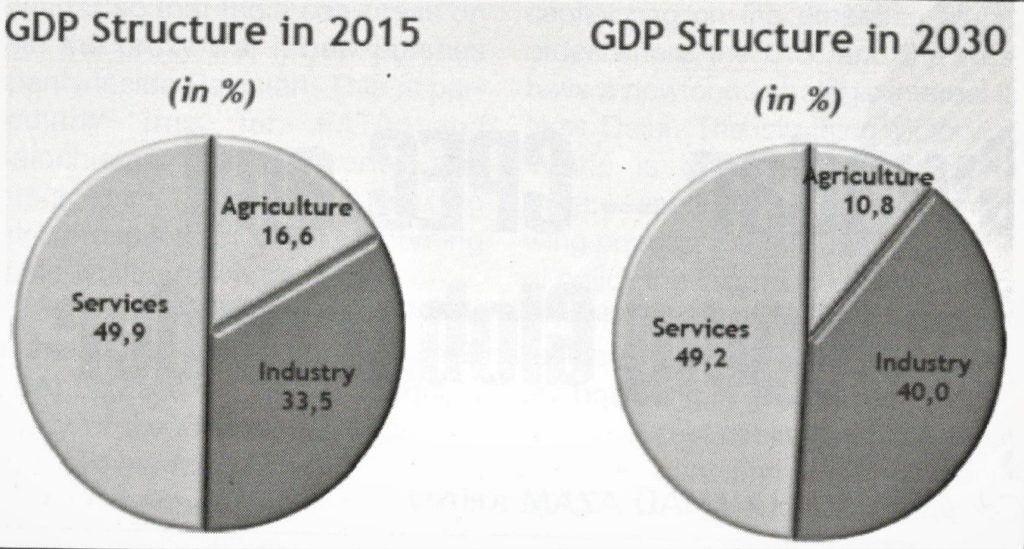
Country’s Export Capacity
On-going measures on to strengthen the country’s export capacity to increase the volume of Uzbek exports by more than 30 times. Despite different global downturns and recessions, Uzbekistan has consistently provided trade surplus over the past 17 years.
Special Economic Free Zones Utilities
Moreover, unprecedented benefits and preferences are provided to investors in “Navoi” Free Industrial Economic Zone and Special Industrial Zones “Angren” and “Jizzakh”. Investors are exempt from almost all types of taxes, depending on the amount of investments from 3 to 15 years (FIEZ “Navoi”), and from 3 to 7 years (SIZ “Angren” and “Jizzakh”).
Agricultural Products
There is a great potential and befitting proposition in the industries of agricultural products processing, automotive industry, textile industry, oil & gas and plastic articles. Small and medium enterprises industry is particularly important, because new Uzbek entrepreneurs in various sectors need exactly new investments, technologies and machines. Number of small businesses has increased by 2.3 times over the last 14 years. Share of small business in the GDP has increased from 1.5 percent in 1991 to 56.7 percent in 2015. Small business provides jobs for 77 percent of the employed population. Share of small business in total industrial output increased from 12 percent to 33.3 percent in 2015.
Fashion Industry
Even Uzbekistan fashion industry has bright prospect in terms of FDIs. The food industry offers good prospects as well. The country not only offers great opportunities for capital goods and consumer goods supply, but it is also particularly interesting for investments in SME in the manufacturing sector.
Privatization Program
The Uzbek Government is realizing a privatization program and looking for foreign partners, especially for the development of the medium industry. Uzbek authorities issued a list of more than 300 companies for which foreign investor are required. There are interesting prospects for Pakistani manufacturers who could create production centers in the country and, therefore, intend to widen their market share in the country. Uzbekistan would like to develop is pharmaceutical industry which needs FDIs too.
Conclusion
Uzbekistan-Pakistan bilateral relations have entered a new phase of better political understanding, greater socio-economic interaction and above all geo-strategic connectivity. There are lots of new opportunities which must be tapped as soon as possible for achieving befitting propositions for both the countries. Uzbekistan is rich in natural resources and energy reservoirs which must be extended to translate better political understanding into sustained socio-economic ties in the days to come.
It is high time that Uzbekistan and Pakistan extended their cooperation in the fields of industries and its associated fields which will provide a win-win situation for both. Uzbekistan offers great opportunities for Pakistani investors to invest in textile, automobile, chemical, alternative energy mix, fashion and even in pharmaceutical industries.
CPEC provides alternative of regional prosperity and connectivity, therefore, Uzbekistan must take positive steps to join it. The visit of Deputy Prime Minister Ulugbek Rozilkulov would pave new chapter of bilateral relations. All “Red-Lines” related to further strengthening of bilateral relations must be rectified to move forward.
H.E. Furkat Sidikov Ambassador of the Republic of Uzbekistan in Pakistan is striving very hard to enhance socio-economic interaction, trade & commerce ties, educational and cultural cooperation and political understanding between the two countries. He is innovative and has suggested lots of doable propositions for the further strengthening of bilateral relations especially in agriculture production, machinery, automobile and renewables (solar, wind energies). He is also working tirelessly to achieve greater connectivity between the countries, businessmen, investors, experts and educationists. On his suggestions, there is a realization at every level that Uzbekistan and Pakistan should focus on establishing direct rail and air links that would go a long way towards improving trade activities.


